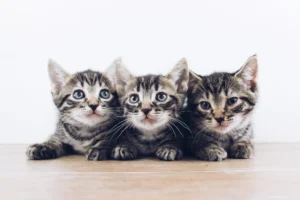Have you ever wondered why our beloved cats and dogs have such short lifespans compared to humans? It’s a question that many pet owners grapple with, as we watch our furry companions age much faster than we do. But rest assured, there are scientific reasons behind this phenomenon.
Biological Differences Between Species
Let’s get scientific for a moment. The key reason behind the shorter lifespans of our beloved cats and dogs compared to humans lies in their genetic makeup and physiological differences. Cats and dogs age at a faster rate than humans, which means their bodies go through more wear and tear in a shorter period.
One major factor contributing to this accelerated aging process is telomeres, the protective caps on the ends of chromosomes. Over time, these telomeres shorten with each cell division, eventually leading to cell death and age-related decline. Cats and dogs have shorter telomeres compared to humans, which means their cells can only divide a limited number of times before reaching the end of their lifespan.
In addition, size plays a role. Smaller animals tend to have higher metabolic rates and faster heartbeats, which can put more strain on their organs over time. This increased metabolic activity can lead to a shorter lifespan for cats and dogs compared to larger animals like humans.
It’s fascinating to see how these biological differences between species can shed light on the mystery of why our furry companions live shorter lives than we do.
Environmental Influence on Aging
Now, let’s shift our focus to the impact of the environment on the aging process of our pets. Just like humans, cats and dogs are influenced by external factors that can either accelerate or slow down the aging clock.
Diet plays a crucial role in determining the health and longevity of our furry friends. A nutrient-rich diet tailored to their specific needs can help maintain their overall well-being and extend their lifespan. On the other hand, a poor diet lacking essential nutrients can lead to various health issues and shorten their time with us.
Regular exercise is another key component in promoting longevity in cats and dogs. Keeping them active helps maintain muscle tone, joint health, and overall mobility, reducing the risk of age-related ailments. So, don’t skip those daily walks or play sessions – they’re essential for your pet’s well-being.
Creating a safe and comfortable living environment for your furry companions can also contribute to their longevity. Providing a stress-free space, regular vet check-ups, and proper grooming all play a part in ensuring they lead a healthy and happy life.
By understanding and optimizing these environmental factors, we can actively contribute to the well-being and extended lifespan of our beloved cats and dogs.
Breed-Specific Longevity
Certain breeds of cats and dogs tend to live longer than others due to a variety of factors. Smaller breeds such as Chihuahuas and Toy Poodles often have longer lifespans compared to larger breeds like Great Danes or Saint Bernards. This is because larger dogs tend to age quicker and are more susceptible to health issues like joint problems and heart conditions.
On the other hand, mixed-breed pets often benefit from a phenomenon called hybrid vigor, where the gene pool is wider, potentially reducing the risk of genetic diseases and increasing overall lifespan. If you’re looking to bring home a furry friend with a longer lifespan, consider adopting a mixed-breed pet or a smaller breed known for their longevity.
Health Care and Access to Veterinary Services
Regular veterinary care plays a crucial role in extending the lifespan of our beloved pets. Annual check-ups, vaccinations, parasite prevention, and dental care all contribute to keeping our furry companions healthy and happy. Early detection of health issues through routine vet visits can lead to timely treatment and better outcomes.
Unfortunately, access to veterinary services can vary depending on location and economic factors, which can impact the longevity of pets. It’s essential to prioritize veterinary care for our furry friends and seek out resources such as low-cost clinics or pet insurance to ensure they receive the medical attention they need to live a longer, healthier life.
Extra Tip: Consider setting aside a small monthly budget for your pet’s healthcare to cover routine visits and unexpected medical expenses, ensuring they receive the care they deserve.
Age-Related Diseases in Cats and Dogs
As our beloved furry companions age, they become more susceptible to various age-related diseases. Common ailments include arthritis, kidney disease, heart conditions, and cancer. Early detection through regular check-ups is key to managing these conditions effectively and maintaining your pet’s quality of life. Symptoms such as increased thirst, weight changes, lethargy, or difficulty moving should never be ignored. Prompt veterinary care and proper treatment can significantly improve your pet’s well-being and longevity.
Quality of Life vs. Quantity of Years
When caring for aging cats and dogs, it’s important to prioritize quality of life over quantity of years. While we all wish our furry friends could live forever, it’s crucial to consider their comfort and happiness as they age. Routine veterinary check-ups, a balanced diet, regular exercise, and mental stimulation are vital components of ensuring a high quality of life for your pet. It’s essential to carefully assess their needs and make informed decisions about their care, especially as they enter their senior years.
- Ensure a comfortable environment: Provide a cozy bed, easy access to water and food, and a warm place to rest.
- Maintain a consistent routine: Stick to a regular feeding schedule, exercise routine, and grooming habits to reduce stress.
- Monitor changes closely: Keep an eye out for any unusual behaviors, symptoms, or signs of discomfort that may indicate a decline in health.
- Consider pain management: Talk to your veterinarian about pain relief options to help your pet stay comfortable and active.
For more information on caring for aging pets, check out this comprehensive guide from the American Veterinary Medical Association: Caring for Your Older Pet.
Coping with Loss and Grief
Losing a furry friend can be devastating, and it’s okay to grieve. Remember that your emotions are valid, and it’s essential to allow yourself to process your feelings. Surround yourself with supportive loved ones who understand the depth of your bond with your pet. Consider creating a memory box with your pet’s favorite toys, photos, and items to honor their memory.
If you’re struggling with the loss, don’t hesitate to seek support from a therapist specializing in pet loss or join a pet loss support group. These resources can provide a safe space to share your emotions and connect with others who are going through a similar experience. Remember, it’s normal to feel a range of emotions, including sadness, guilt, and even anger. Be patient with yourself as you navigate this difficult journey of saying goodbye.
Additional Tip: Planting a tree or flower in your pet’s honor can be a beautiful way to create a lasting tribute to their memory.
Interesting Facts About Aging in Cats and Dogs
As our beloved pets age, it’s essential to understand the unique changes they go through. Did you know that small dogs tend to live longer than large breeds, with some toy breeds reaching their late teens and even early twenties? Cats, on the other hand, are known for their longevity, with some reaching their early twenties and beyond.
Key Fact: Cats and dogs age at different rates, with one year of a cat’s life equivalent to around five to seven human years, while a dog’s age can vary based on size and breed.
Understanding your pet’s aging process can help you provide the best care as they enter their golden years. Regular veterinary check-ups, a balanced diet tailored to their age, and keeping them mentally and physically active can all contribute to a happy and healthy senior pet.
Remember, every moment with your furry companion is precious, so cherish the time you have together and celebrate the joy they bring into your life.
Alex, a passionate animal lover, has experience in training and understanding animal behavior. As a proud pet parent to two dogs and three cats, he founded AnimalReport.net to share insights from animal experts and expand his knowledge of the animal kingdom.




